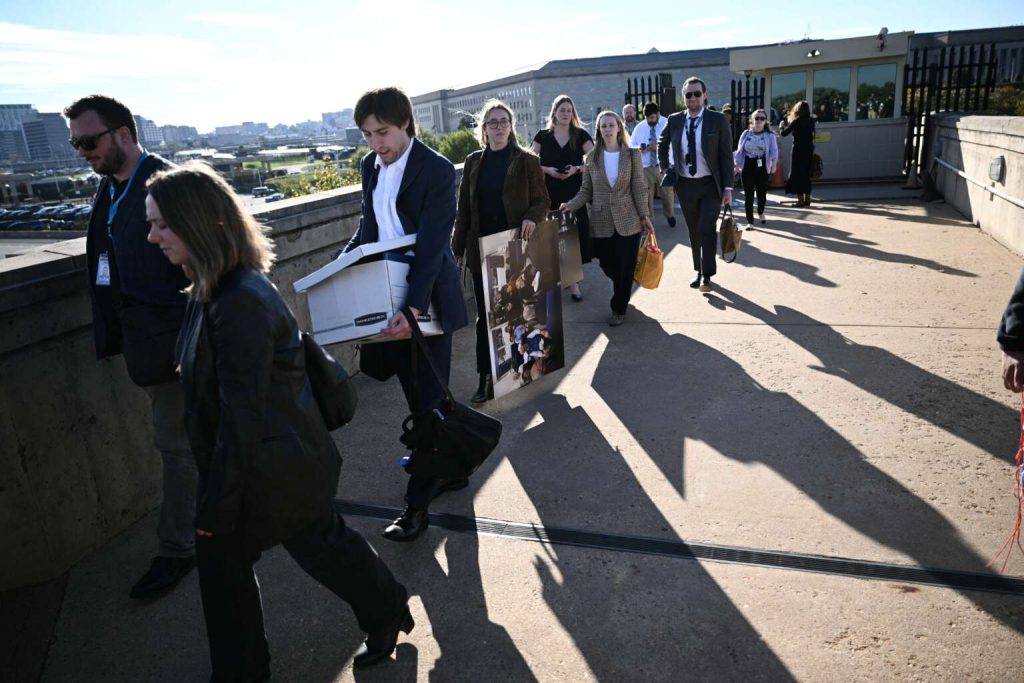Listen to the article
Pentagon Unveils New Press Corps Amid Controversy Over Media Restrictions
Less than a week after mainstream Pentagon journalists surrendered their press credentials in protest, Defense Secretary Pete Hegseth’s administration has unveiled what it calls “the next generation of the Pentagon press corps,” drawing immediate criticism for assembling a roster dominated by right-wing media outlets.
The controversial development follows Hegseth’s implementation of new press restrictions at what President Donald Trump has rebranded as the Department of War (DOW). These rules significantly limit reporters’ movements without official escorts and, most contentiously, prohibit journalists from soliciting or reporting information not explicitly approved by the government, even if unclassified.
“We are excited to announce over 60 journalists, representing a broad spectrum of new media outlets and independent journalists, have signed the Pentagon’s media access policy and will be joining the new Pentagon press corps,” announced Sean Parnell, the Pentagon spokesperson, in a statement posted to X on Wednesday.
According to Parnell, only 26 journalists from 18 outlets among the traditional Pentagon press corps elected to accept the new restrictions. This mass exodus includes journalists from traditionally conservative outlets like the Daily Caller, Newsmax, Washington Examiner, Washington Times, and even Fox News, where Hegseth previously served as a host.
The Washington Post, which obtained a draft announcement, reported that the new coalition includes media operations with close ties to Trump allies: Lindell TV (created by MyPillow CEO Mike Lindell), Gateway Pundit, Post Millennial, Human Events, and National Pulse. Also joining are Turning Point USA’s Frontlines, Tim Pool’s Timcast, and a Substack newsletter called Washington Reporter.
“New media outlets and independent journalists have created the formula to circumvent the lies of the mainstream media and get real news directly to the American people,” Parnell asserted. “Their reach and impact collectively are far more effective and balanced than the self-righteous media who chose to self-deport from the Pentagon.”
The announcement has prompted immediate backlash from journalism professionals and media critics. Many have characterized the new press corps as “a predictable clown car of loyalists” and “a who’s who of pro-Trump propagandists.” Television news producer John Flowers remarked that the announcement “reads like they’re announcing the handpicked contestants of a new reality series.”
Matthew Gertz, a senior fellow at Media Matters for America, described the development as “Press corps as adjuncts of the administration,” while Julian Pecquet of Africa Report sardonically called them “a lot of stenographers.”
Breaking Defense reporter Valerie Insinna highlighted that “all of the defense trade publications refused to sign the Pentagon’s media access policy,” noting that these outlets “write about budget and military technology — not exactly what you think of when you envision ‘activists who masquerade as journalists.'”
The traditional Pentagon press corps, now working without direct access to the Pentagon building, has responded by publicly sharing alternative contact methods. Several reporters used Parnell’s announcement on X as an opportunity to provide their Signal messaging app contact information.
“If anyone is interested in speaking to a member of the current generation of the press corps… the one that is still aggressively covering the Pentagon,” wrote Konstantin Toropin of the Associated Press, “you can find me on Signal.” Reuters’ Idrees Ali similarly offered his contact information to those wanting to reach the “‘old’ generation of the press corps, which continues to cover the Pentagon accurately and aggressively.”
Heather Mongilio of USNI News emphasized that “defense journalists that turned in their badges continue to cover the Pentagon and military, even if they do not have desks,” referencing recent coverage of military strikes as evidence of their ongoing reporting capabilities.
The Pentagon’s move represents a significant shift in how the U.S. military communicates with the public, replacing established journalistic institutions with outlets more explicitly aligned with the administration’s political viewpoint. Critics view this restructuring as an attempt to control the flow of information rather than facilitate transparent coverage of military affairs.
As this situation unfolds, both the traditional defense press corps and the newly credentialed outlets will face scrutiny over how effectively they serve the public’s right to be informed about the activities of America’s military leadership.
Fact Checker
Verify the accuracy of this article using The Disinformation Commission analysis and real-time sources.




9 Comments
Restricting unescorted access and prohibiting reporting of unapproved information is worrying. This could undermine the public’s ability to scrutinize the government’s activities.
I agree, these new rules seem to conflict with the principles of a free press. It’s crucial that journalists can report on the Pentagon without undue interference.
This sounds like a concerning move towards controlling the narrative. Restricting independent journalism raises red flags about potential overreach or suppression of information.
I share the worry that this could become a ‘propaganda corps’ as critics suggest. Impartial, fact-based reporting is crucial for an informed public.
Interesting development, though the accusations of propaganda are concerning. I hope the new press corps can maintain objectivity and provide fair, balanced reporting on the Pentagon’s activities.
It’s a tricky balance between transparency and national security. Hopefully the new rules don’t unduly restrict legitimate press coverage.
While I understand the need for security, the accusations of propaganda are concerning. The Pentagon should ensure the new press corps maintains independence and objectivity.
The new press corps raises valid questions about transparency and the Pentagon’s relationship with the media. I hope they can find a way to balance national security and public accountability.
While I understand the need for security, limiting reporters’ access and dictating approved information seems heavy-handed. A free press is essential for democracy.